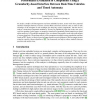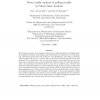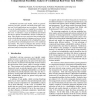365 search results - page 11 / 73 » Semi-automatic derivation of timing models for WCET analysis |
110
click to vote
IPPS
2005
IEEE
15 years 5 months ago
2005
IEEE
In recent years the Unified Modeling Language (UML) including its profiles gained increasing acceptance as a specification language for modeling real-time systems. It is crucia...
CORR
2010
Springer
14 years 10 months ago
2010
Springer
nalysis of a TA modeled component. First, we abstract fine models to work with event streams at coarse granularity. We perform analysis of the component at multiple coarse granular...
106
Voted
RTSS
2006
IEEE
15 years 5 months ago
2006
IEEE
Caches have become invaluable for higher-end architectures to hide, in part, the increasing gap between processor speed and memory access times. While the effect of caches on timi...
PE
2008
Springer
14 years 11 months ago
2008
Springer
In this paper we present a new approach to derive heavy-traffic asymptotics for polling models. We consider the classical cyclic polling model with exhaustive or gated service at ...
ISORC
2008
IEEE
15 years 6 months ago
2008
IEEE
Conditional real-time task models, which are generalizations of periodic, sporadic, and multi-frame tasks, represent real world applications more accurately. These models can be c...



